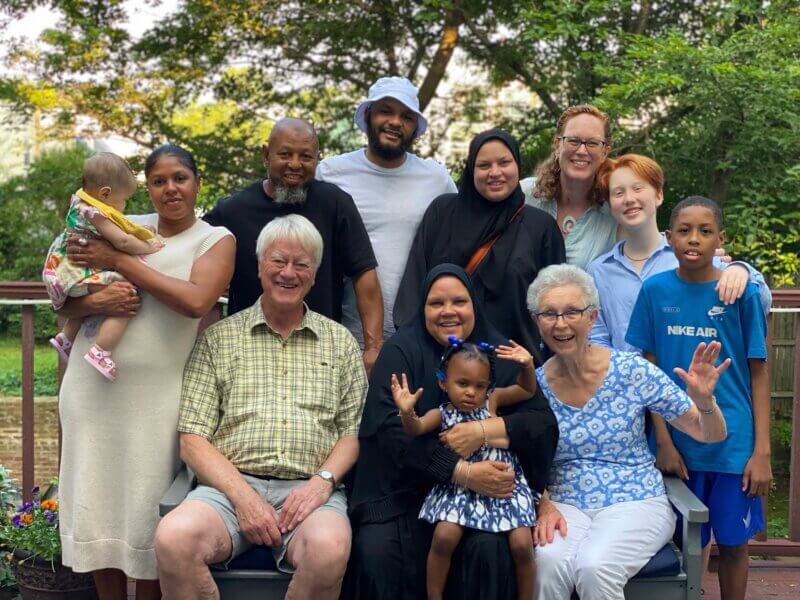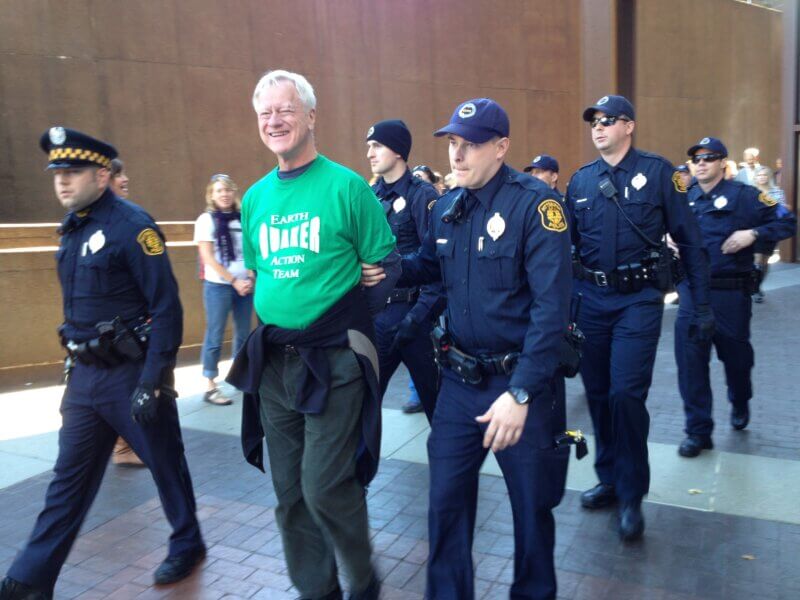Dancing with history and making the world better
George Lakey didn’t realize he was doing anything wrong when, in the 1940s at the age of 12, he gave a sermon calling for racial equality.
He had been picked by leaders in his “Bible-thumping” evangelistic church who had expectations that he would become a boy preacher. Lakey had no idea that calling for racial justice was controversial. He just knew it was God’s will that the treatment of Blacks needed to improve.

George Lakey and his family last June.
He didn’t realize until after the service that it was not the church leaders’ will, nor that it would be the first and last time he would be asked to preach by that church.
“They didn’t want to hear any more,” Lakey said in a phone conversation. “My entire boy preacher career was less than one day.”
But his career of speaking out for social justice was just beginning.
Lakey will be speaking at Middlebury College at 4:30 p.m. on Saturday, April 29, and at a Middlebury Friends Meeting he’ll give an informal talk at 10:30 a.m. on Sunday, April 30.
At 4:30 p.m. on Thursday, April 27, scenes from a forthcoming movie about Lakey’s life will be shown at Middlebury College’s Dana Hall.
Also, on Sunday, April 30, he will be talking at the Charlotte Library. Afterward, his latest book, “Dancing with History: A Life for Peace and Justice,” which just came out this past December, will be for sale, and he will be available for book signing.
“Dancing with History,” his 11th book, has been praised by such prominent activists and authors as Daniel Ellsberg and Bill McKibben.
Ellsberg, the former U.S. military analyst who released “The Pentagon Papers,” said, “George Lakey stands out for the sheer range of his contributions to peace and justice, especially in strategy and theory, organizing, innovative and risky actions, and teaching and training others. His upbeat, soul-driven spirit underlies it all, as you’ll catch in this revealing memoir.”
During his Vermont appearances, Lakey will be staying in Charlotte with Ruah Swennerfelt and Louis Cox, who have known him for years.
“He’s probably one of the best speakers that I’ve ever experienced. And partly, it’s because he’s engaging. He’s funny. He has the best laugh, the most wonderful smile,” Swennerfelt said. “All of those things are wrapped up into a human being who’s very accessible. He loves to meet people.”
During the summer when he was 19, Lakey was working on a Quaker project in Lynn, Mass. One night he went for a walk on the beach, wrestling with the question of what he should do with his life, and it occurred to him: “Wouldn’t it be an amazing life to just commit myself to making the world better?”
Then, it was as if he had been tapped on the shoulder. “I opened my heart and asked God what my life was supposed to be,” Lakey said. “The answer was clear as a bell,”

George Lakey is arrested in 2013.
Lakey has led a life of taking controversial positions in hopes of making the world better, and he’s been rather successful at it. “My life is such a string of victories,” he said.
He expects to be arrested soon as part of a group blocking the entrances to Vanguard Group’s international headquarters, but he is confident that he will be released well before his Vermont appearances. Lakey said they are protesting because the financial management corporation invests so much of the $7 trillion it controls in coal, oil and gas.
“Vanguard presents itself as a friend of our future, of our security, and at the same time, it is destroying the future,” said Lakey.
He’s not sure how many times he’s been arrested. He stopped counting at a dozen more than 20 years ago.
In the late 1950s he was active in the ban-the-bomb movement. During the 1960s he was active in the Civil Rights Movement and was arrested at a sit-in in 1963, protesting to get the Woolworth’s chain to integrate its lunch counters.
In 1964, he worked on the Freedom Summer effort, teaching nonviolence to those going south to register disenfranchised Black voters. More than 1,000 students went to Mississippi that summer.
Out of that experience Lakey co-authored with Martin Oppenheimer “A Manual for Direct Action: Strategy and Tactics for Civil Rights and All Other Nonviolent Protest Movements,” a book widely used by organizers, sometimes referred to as the bible of the Civil Rights Movement.
Teaching and learning have been a constant during his life. “If you keep learning it’s OK to keep making mistakes because you learn,” Lakey said. “I’ve made my share of mistakes in working for justice and peace, and I learned a tremendous lot.”
He’s also been a lifelong educator having led more than 1,500 workshops on five continents, in addition to teaching at Swarthmore, the University of Pennsylvania and Haverford College.
During the 1970s, he was part of the movement that persuaded the U.S. Navy to stop using the Puerto Rican island of Culebra for target practice, helped with the effort that convinced President Carter to de-fund the B-1 bomber program, and came out as gay in 1973 becoming part of what he called “Gay Liberation’s early visionary days.”
After giving so much of his life to equality, justice and peace issues, in 2009 his focus shifted to the climate because progress on other goals is going to be so much harder “if we are distracted by disaster after disaster after disaster coming because of the neglect of the climate,” he said.
He jumped into the environmental movement by co-founding the Earth Quaker Action Team to work on building a sustainable economy. It won its first campaign, compelling PNC Bank to get out of the business of funding mountaintop removal for coal mining in the Appalachians.
Working on his latest book proved to be a bit of a struggle since it’s a memoir. “I sweated over it a lot. It’s really something trying to write a life story,” Lakey said.
But his effort to make himself vulnerable in “Dancing with History,” by including both the victories with his human failings, was rewarded by one of the best memories of his life. When he came out on stage for the book’s launch in Philadelphia, he was gobsmacked to see the front row filled with his family — his grandchildren, his children, his ex-wife and his longtime lover.
He’s pleased to be touring to promote the book and sharing what he’s learned from a life of working to make the world better.
“I’m happy to be here right now, 85 years old and able to say, ‘Well, you know, when we ran into that kind of situation in the ’60s, this worked well.”


